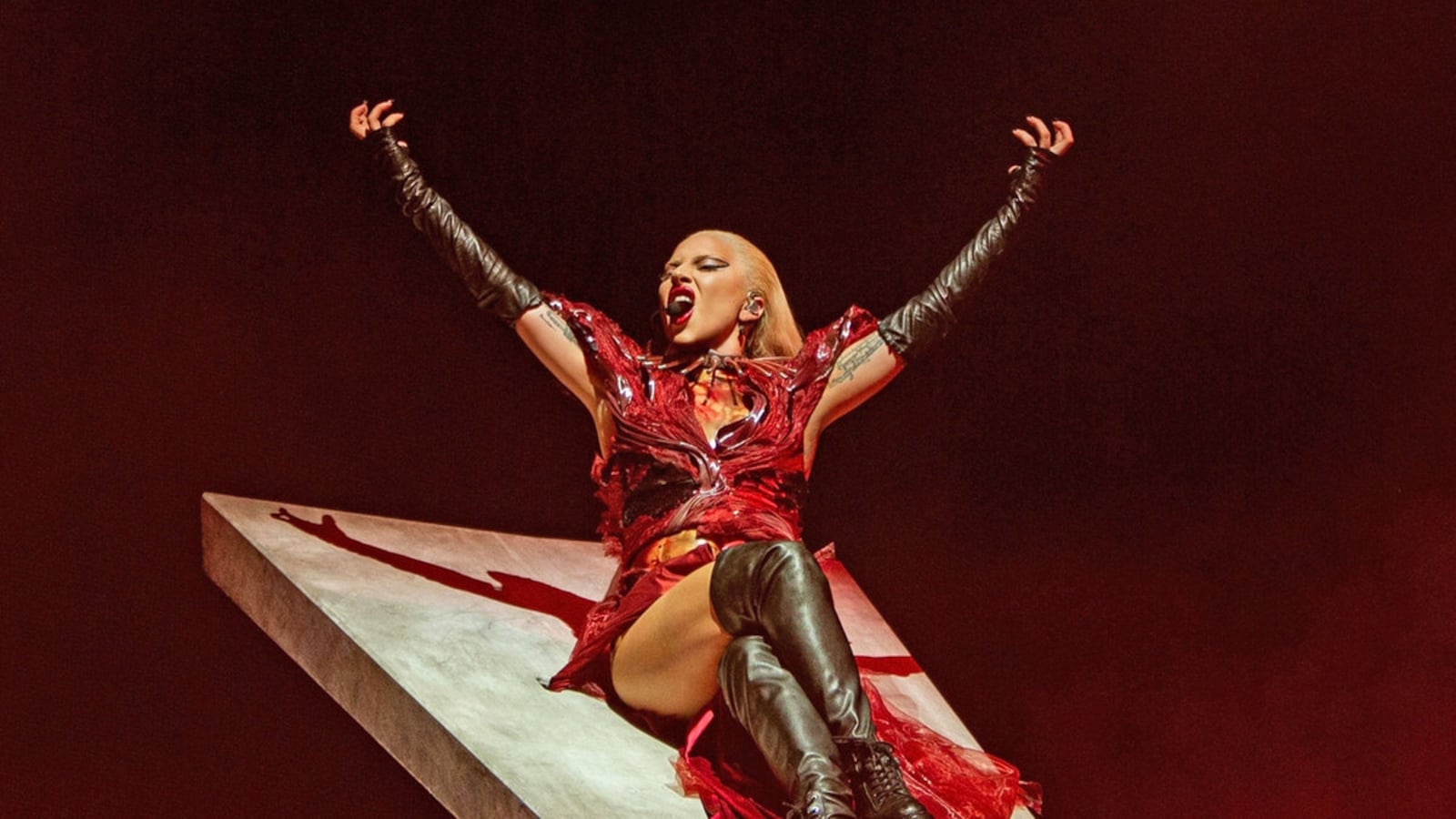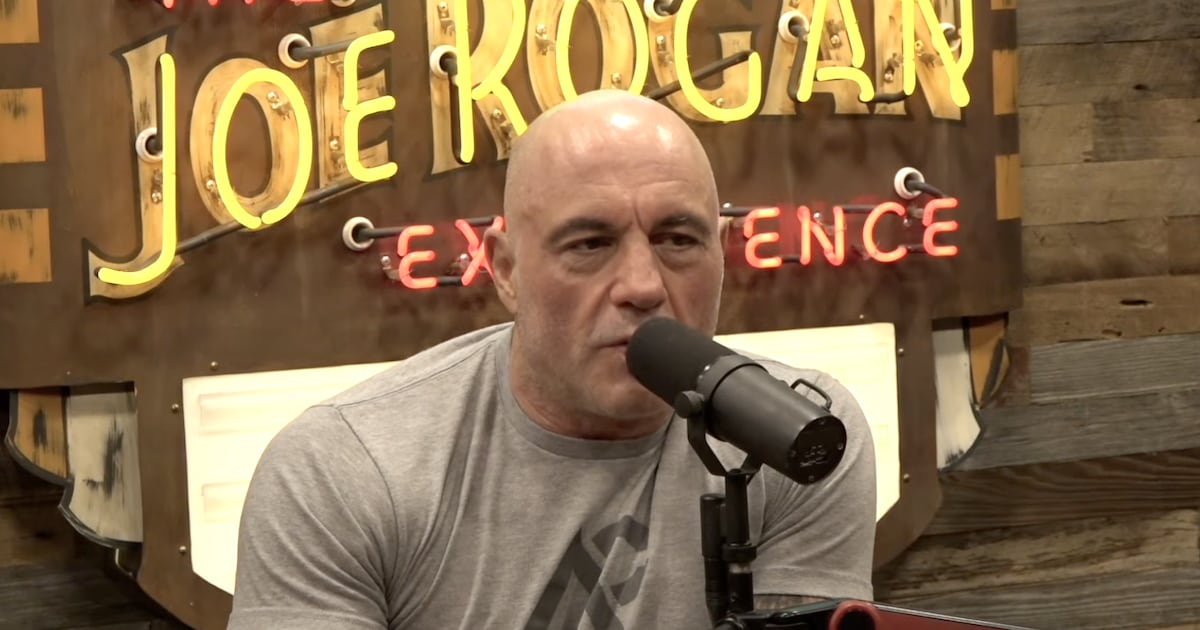The start of the COVID-19 pandemic gave us some of the absolute worst media imaginable. Anne Hathaway’s luxury department store heist movie was mind-numbing, despite all of those words together suggesting something incredible. Judd Apatow’s latest effort left everyone wishing the pandemic had shut down its production. For god sake, Bette motherfucking Midler agreed to be in an HBO original movie called Coastal Elites. It was a time of deep crisis.
But what stands as one of the biggest pop-cultural tragedies of that time, at least for my gay ass, was the scrapped promotional rollout for Lady Gaga’s Chromatica. The superstar’s long-awaited sixth album ignited the weary souls of fans when its first single was announced in February 2020, just two weeks before the world shut down. Initially, Gaga planned an expansive album launch, the kind she pioneered for the modern pop singer—and that her own career had not seen since 2013’s hotly contested ARTPOP era. For Chromatica, Gaga had planned a surprise Coachella performance alongside Blackpink, award show performances, a worldwide promo tour, and “lots of other fun surprises” that had to be discarded when it became clear that COVID-19 was very much here to stay. And then, there was the Chromatica Ball, the world tour originally planned for summer 2020 and that had to be delayed so many times, it became a joke among Gaga’s fans.

Lady Gaga puts her hands over her eyes during the Chromatica concert.
HBOOf all of the what-ifs that remain from the Chromatica era, its tour is not one. The show went ahead in summer 2022, selling out each of its 20 dates. Now, the sweeping production is making its way to your living room, with a high-energy concert film, Gaga Chromatica Ball, debuting on HBO May 25. The film is Gaga’s first professionally recorded concert since 2011’s Lady Gaga Presents the Monster Ball Tour, which earned the singer raves while her star was rising.
Thirteen years later, this new special replicates all the excitement that swirled around the singer in those early years. It’s an exhilarating watch from start to finish, bolstering an already stellar show with trippy editing and crisp, stylistic filmmaking. The film refines Gaga’s big, offbeat ideas and makes them palatable for the average viewer, luring them into Chromatica’s pulsating electropop soundscape. Maintaining that pull for this long is a feat in and of itself, but Gaga Chromatica Ball feels like a victory lap. The movie is a celebration of the singer’s ability to pull herself and her art out of unprecedented global destruction, amplifying the album’s core themes with stunning new resonance.
Gaga Chromatica Ball is divided into a prelude and four acts, and when Gaga begins Act I with “Alice,” Chromatica’s opening track, it feels like a prominent nod to the singer’s long road back to the stage. “Could you pull me out of this alive?” she sings, suspended in air and strapped to a concrete slab. A preview clip of the number’s glitchy editing, released on social media last week, inspired some jabs from fans, but the frenetic cuts work in the song’s favor. At the start of the show, we meet a Gaga who is toiling inside of her mind, frantically trying to see outside of herself and her own dread. The following songs, Chromatica’s “Replay” and The Fame Monster’s “Monster,” echo that confusion. And while the film’s editing—which Gaga oversaw entirely—might be a bit on-the-nose, they track for a pop star whose entire career has been about weaving subtext into garish, playfully literal musicianship.
Anyone unfamiliar with those Chromatica tracks has only seconds before they fall head over heels for the songs, thanks to tight stage choreography and gorgeous costuming. (“Replay” is particularly fun to watch, as Gaga high-jumps around the stage, proving that her titanium hip is warmed up and ready to go.) But Gaga traditionalists will be pleased by the show’s prelude, which includes three essential hits, thrust through Chromatica’s lens. “Bad Romance” opens Gaga Chromatica Ball, with the song’s infectious repeated chants laden with new guitars and violins. Dressed in Klaus Nomi-meets-RoboCop couture, she moves into “Just Dance” and “Poker Face,” the former a thrilling reminder of Gaga’s origins (and penchant for making earworms that still hit just as hard 16 years later), while the latter is as perfectly fine as it has always been. Still, Gaga’s ability to make even her most overplayed songs sound fresh on tour is a marvel to watch. The energy never dissipates, even for a song she’s performed no less than 15,000 times. Quick crash zooms timed to the song’s beats help keep that spirit up, too.
It’s easy to exaggerate when it comes to someone like Gaga, whose art was founded on hyperbolic songwriting and metaphor. But it’s no overstatement to say that her ability to maintain that same vigor throughout the first four acts is downright astounding. By Acts II and III, Gaga is only just getting started, despite being halfway through her show. Act II’s performance of “Sour Candy” is one of Gaga Chromatica Ball’s must-see highlights, if only because it’s Gaga at her very best. There are no filmmaking tricks here, just fluid editing that reinforces Gaga’s good, old-fashioned theatricality. She begins the song by moaning into her headset before roaring forth into a wild “YEEEEEEEAAAAAAAAHHH!” The moaning and groaning continue throughout the song as Gaga hits each move in the song’s choreography in-line with its plinking house instrumental. Watching her ooze all of that vitality is like seeing a stir-crazy kid finally go outside; this is the music she’s been dying to perform, and she won’t waste a second of it.
Act III’s soulful performance of the vogue track “Babylon” has a similar energy. “Have you ever had to battle for your life?” Gaga asks the crowd of screaming fans. “Have you ever had to dance through all your pain? And laugh through all your tears? You better work tonight, LA! Put your hands up, now let’s serve.” From any other pop star, both the sincerity and the servery could easily be disingenuous or cloying, a trendy appeal to the growing market of queer consumers. But Gaga proved her allegiances long ago, as the same act’s performance of “Born This Way” at the piano reminds us. Act IV, the show’s stripped-down portion, follows. While a breather is necessary in this 117-minute movie—Gaga Chromatica Ball is a hectic dose of pop fury—it's no less breathtaking to watch Gaga with nothing but a piano and a microphone.
There is something so thrilling about watching one of the generation’s greatest vocalists absolutely wail on a mic, and Gaga is intent on proving her chops. When she stares into the camera, softly singing the words to A Star Is Born’s “Shallow” and “Always Remember Us This Way,” any need for costumes and choreography dissipates. This is a virtuoso at work, reminding us that—as much as she loves to put on a big spectacle of a show—when it’s just her and her lyrics, Gaga has more than enough to offer. Though, I will say, the sheen wore off a little bit seeing the footage from Gaga’s Nurtec ODT ad in its proper context; not even the most remarkable performances can excuse being in the pocket of big pharmaceuticals. But, I digress.

Lady Gaga crosses her arms during the Chromatica concert.
HBOGaga Chromatica Ball lacks the small, confessional documentary snippets of Lady Gaga Presents the Monster Ball Tour. This is a straightforward concert film, with the audience kept at an audience’s distance. Make no mistake: The movie is superb without any snippets of Gaga’s mental diaries, but it is, at times, a bit too polished. The special lacks the same intimacy that Gaga’s early work had, which can sometimes be frustrating given that Gaga has claimed Chromatica is such an intensely personal album. But perhaps that aloofness is intentional. While this show’s storyline is vaguer than other Gaga tours, it’s not hard to surmise from the show’s brutalist cement stage, its cold, medical hydraulics, and the prosaic and often abstract interludes (another classically Gaga element of the tour, which fascinate to no end) that the Chromatica Ball is all about rallying against suffering. The show becomes more colorful and personal—within reason—as it continues. And when it’s over, Chromatica’s opening “Chromatica I” interlude plays over the credits, suggesting that this cycle of self-motivated recovery continues eternally.
By that ending, Gaga Chromatica Ball feels as all-consuming as being at the show yourself. It’s a mobilizing watch experience, one that will make you dance, sing, and sweat. It’s rare to have such proximity to a performer where she’s most in her element: on the stage. For all of the community forged by The Eras Tour, and the awe-inspiring execution of Renaissance: A Film by Beyoncé, Gaga remains very much in her own lane with her film. Any artifice collapses when the lights go down and Gaga demands her fans, no less than 25 times, to put their hands up. After such a long journey to get the show off the ground, Gaga Chromatica Ball makes the show—and every bit of strife and every delay incurred—well worth the wait.






